
Mohammad Rakibul Hasan
Photojournalist
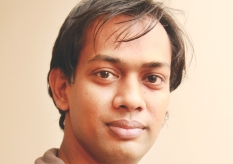 |
In the journey of life, there are some remarkable characters who stand out in the midst of millions. They touch our lives through their artistic skills. They are the people behind lenses who capture moments that speak a million unsaid words. Mohammad Rakibul Hasan is one such gifted personality who is currently pursuing a Postgraduate Diploma in Photojournalism at the Asian Centre for Journalism (ACFJ) under Ateneo De Manila University, Philippines under a prestigious scholarship programme. Initially, a student of University of Sydney, UBS Film School, studying in Film and Video Production, Hasan, by chance or fate, decided to change his line of occupation from Film Studies to Photojournalism. He masters the art of Documentary and Cinematography and thus his project “Restoring Lives” has been quite popular in countries like France, where art is celebrated as life. Other works include his photo project “Salt” based on noble causes like climate change. It was showcased in an exhibition held in the Getty Images Gallery in London.
Hasan's achievement does not stop there; his masterwork photographs have also been published by the supplement “Spectrum” published by UK's The Sunday Times newspaper. Hasan's dream of turning his hobby of photography into a profession has also earned him 70 international awards. With a man of such talents, so much more can be said that words in itself will seem too little. Hasan, being an expert in Motion video and film, measured his options in the Film industry in Dhaka after arriving from Australia. Due to some technical difficulty, like arranging a creative team with exclusive professionals and small target market of viewers, he decided to delve into a different stream.
For Hasan, his journey towards Photojournalism was not a gamble. In the age and day of the internet, he always stays well connected with up to date news on documentary photography. For him, he has invested his genius into his work and the real inspiration lies behind the vulnerable people of the society whose sorrows are not comprehended fully. Through pictures, Hasan aims to raise these unspoken voices. Figures that motivate him are those who are just a mile ahead of him, like war photographer James Nachtwey, Sebastiao Salgado and his close friend GMB Akash, who is a photojournalist by occupation as well.
Hasan's ambition is to take Bangladesh to a different level in academia. His plan is to pursue further education in areas like Art History and Visual Anthropology after which he plans to come back to his homeland and take up teaching as a profession. The booming number of highly spirited amateur photographers of the country has given him the reason and enthusiasm to extend his knowledge to those who are interested to pursue studies in this area. He hopes that in the next decade the government and the private sectors will take up the initiative to at least offer diploma courses in Multimedia Journalism, Photojournalism and the likes.
To inspire the youth, Hasan himself took the initiative in the year 2005 to open a photography group known as Bangladeshi Photographers (BP) for young photographers of Bangladesh. Currently, the number of members in this group has exceeded by thousands and has already held several successful exhibitions. Additionally, Hasan also conducts regular workshops to help future photographers find their place in the print media industry.
Hasan believes that he can benefit the young ones in our country by helping them learn the technical aspects of photography. He not only provides them with valuable feedback but also aids them to find their true potential in this arena. He is confident that in this era of Internet, the enthusiastic youth can help the nation earn foreign currency through outsourcing.
By Sumaiya Ahsan Bushra
Sharmin Akhter
Student
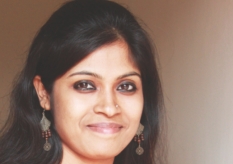 |
For those who struggle more, the fruit of success is greater when compared to those who have the easy way out. Studying in a small local school in Jatrabari, excelling in her academics, Sharmin Akhter dreamt to touch the sky. Her wishes were fulfilled when she entered University of Dhaka, studying her undergraduate degree in the Department of Biochemistry and Molecular Biology. Throughout her academic life, Akhter was always been sincere. At a much later age, upon confronting the harsh reality of the world, she realised the true value of education and its importance on a global perspective.
Akhter's inspiration, most evidently, was her family, in particular her father, a peon working in a newspaper office in Dhaka, who struggled through to ensure that his daughter receives a proper form of education and is capable of establishing herself, and Akhter never let her parents down. Akhter received financial assistance, a form of government scholarship in high school and later on at university as well; she avails the alumni association yearly scholarship. Apart from parents and well wishers, Akhter always received support from her teachers at school. Coming from a close knit and supportive community, the school teachers were always guiding her to meet her goals.
However, while in the process of obtaining what she wanted, Akhter did falter once. Her inability to get into medical school broke her heart but it did not stop her journey. She buckled up and opted for something similar, something that would equally benefit the society and its people. Her inspirations, at this stage in life, were once again her mentors, some of them who were recognised personalities, for works like jute sequencing and other agricultural developments.
Akhter's philosophy was always towards women empowerment, growing up reading and almost worshipping women like Sufiya Kamal and Rabeya Khatun. Akhter knew that women had to make their own place in the world. Her parent's encouragement drove Akhter to be a stronger person, one who believes that when there is a will there is a way.
Akhter wants to work in organisations like ICDDR,B before going abroad for her PhD programme. She wants to proceed in the field of genetic engineering and biotechnology. She plans to make inventions in the field of drug development, one being a form of drug mechanism that involves the changing patterns of drugs. Her ideas are mostly generated from international theories, which she wants to implement in the local market. She also plans to work for noble causes -- eradication of diseases like HIV. Her suggestions might be ambitious but they certainly seem possible. She asserts that HIV is a curable disease. According to current research, it has been found that if the protoplasm is removed, and the cell membranes destructed in the process, then the HIV virus will not be able to bind with the DNA, a result that will stop human beings from being HIV affected.
In future, Akhter hopes to work in areas where biotechnology can play a crucial role. Akhter wishes to see biochemistry as a pure field in diagnostic centres, food and nutrition. She earnestly hopes that those students, who express themselves better outside Bangladesh, should come and compete within the country. She also hopes for an education system that is non elitist.
As a career, Akhter wants to be a researcher, but she would love to go into teaching. In the next one decade, she is hopeful that the country will see some changes in her field and in other areas, like illiteracy and transport.
By Sumaiya Ahsan Bushra
Pias Majid
Writer
The word 'achiever' is an objective term. How we define it is not just a matter of perception. It is more about having a general notion. Having published four books in the last four consecutive years is no joke, especially when it is written by someone of a very young age. Success comes with hard work and dedication. This in itself makes the definition of the word 'achiever' quite clear to us. Pias Majid, a popular name amongst the youth, is an author/poet who received his Bachelors and Post Graduate Degrees in History from Jahangirnagar University.
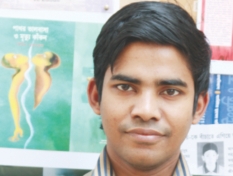 |
Majid was always attached to the Biswa Sahitya Kendra. The study sessions at the centre deeply attracted him. There he had the opportunity to read books by authors ranging from Sharadindu Bandapadhyay to Victor Hugo. He and a few of his friends set up a literary organisation named 'Bhorer Pakhi' during his college days and also published a magazine. Majid took writing seriously from around this time. His first poem was published in Natun Diganta, edited by respected author Professor Sirajul Islam Chaudhury. While studying at Jahangirnagar University, the company of the late playwright, Selim Al Deen and of poet, Mohammed Rafiq, strengthened his involvement with the literary world.
Majid considers Bangladeshi's social attitude to literary practice a matter of concern. If a youngster is involved with writing poetry or with the world of literature, it is often looked upon as a symptom of madness. Writing is not an established profession in Bangladesh and as a result, quite logically, families of the poets and authors still consider literary practice to be an unconventional field.
Professionally, Majid would like to be more involved with prose writing as well as poetry. He feels that there is a scarcity of thought provoking prose in our literature. In today's world when information is readily available, we should be more reflective of the world around us. However, somehow, we are disconnected from the world of literature on various levels.
Majid believes that it is important to strengthen the democratic system in order to help Bangladesh develop. Only a transparent and responsible democratic system rather than just the election based democracy is vital in ensuring the true development of Bangladesh. Unless the administration is freed from the cycle of bureaucracy, he is positive that the measures for development taken by the government will not reach the deprived people.
It is a common belief shared amongst many that when it comes to dreams, the sky is the limit. We have achieved a free nation of our own after so many sufferings and deaths. Majid looks back at 1971 with pride. He is hopeful by the possibilities that this country has to offer. He claims that this should be the generation that should build upon the dreams of our forefathers.
In the next decade, he would like to see the people of the country leave their petty differences aside to unite and transform Bangladesh into a beautiful and prosperous nation. He would like to see development in the already excelling IT sector. He dreams of a nation free from corruption, poverty and illiteracy. He does not want to see Bangladesh hitting the negative headlines on world media but rather would like to see Bangladesh as an example of a successful country on the world map.
By Sumaiya Ahsan Bushra
Tahsan Rahman Khan
Lecturer and Singer
Tahasan Rahman Khan has been a Senior Lecturer of Marketing at the University of Liberal Arts, Bangladesh (ULAB) since June 2010. He took up the profession after returning to Bangladesh upon completing his MBA from Carlson School of Management, University of Minnesota. He is a recipient of the Fulbright Scholarship funded by the United States Department of State and also the Carlson School of Management Scholarship funded by the University of Minnesota. He completed his undergraduate degree from IBA, Dhaka University. He is also a singer-songwriter and a composer with a portfolio of 5 full-length audio albums and numerous other projects. He has also explored other media outlets in Bangladeshi media, but prefers concentrating in his musical aspirations.
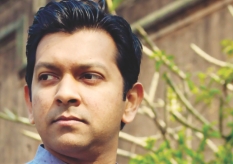 |
|
Photo: Courtesy |
"I got into teaching inspired by my mother who is a Professor at the University of Dhaka. And the inspirations for my music were definitely my parents who ensured that I receive institutional training in music from an early age, and also my elder brother who bought me my first keyboard which helped my transition from traditional music to contemporary music." He adds, "There are difficulties a musician has to face but I prefer concentrating on the positive sides. To those who want to venture into the musical industry, some people are going to judge you, not because they want you to succeed, so ignore them and concentrate on the constructive criticisms that will help you learn to become a better artist."
Tahsan plans to keep continuing with what he is doing now-- balancing an academic career with a career in the entertainment industry. He says, "More specifically, I want to create new songs that advocate inner peace through music, an initiative currently being explored with my new band "Tahsan and The Sufis". Apart from that, I plan on getting a PhD to further my career in teaching, and one day become a positive role model for the youth of the country."
Like everybody else, Tahsan has hopes and dreams for his country. "What I would like to see is an economic growth that is not being eaten away by inflation, a diminishing gap between the poor and the rich, harmony between the two political camps, enterprising youth who would create new businesses and global brands, and most importantly, people who have figured out how to be happy with what they have."
By Naziba Basher
Madol Hassan
Writer
He carried a flute to college, preferred writing songs rather than attending classes and defied the university dress code by wearing kurtas every other day; Madol Hasan was bound to become a writer. As the Shuishabari-based writer shared stories from his past, one couldn't help but notice certain events that displayed striking similarities to those of legendary writers.
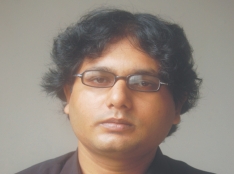 |
|
Photo: Courtesy |
“I never used to followed rules when I was in college. There was this one instance when my Principal actually took away my flute since I didn't follow the dress code. I later apologised and got my flute back,” says Hasan. While in college Hasan was more interested in exchanging rhymes and very often got into discussions on poetry with his professors and batch mates. A number of these conversations and events, he says, influenced his work. One of them was, entitled 'Shadokh er Oppekhay,' a sonnet which was written based on one of his college-experiences.
“Getting influenced is like a relay race where you meet different people and get inspired by them,” he says. Hasan further says that he was more influenced by the leftist communities back then.
Having completed his Bachelors in Bangla, Hasan entered the realm of writers with his first book, entitled 'Kabobbhastishi,' in 2001. “It was a book about my friends, my relatives and various other social matters,” he says. Following the release of his first book, he finished his Masters from Chittagong University and released his second book in 2003.
When asked as to who influenced him to take up writing as a career, Hasan credits his father. “My father had a library and that played an important role in helping me cultivate my reading habit. One of my first influences was the Geetanjali. I also read many stories of Kishan Chandra and many other noted artists,” explains Hasan.
Many people, according to Hasan, think that one needs to have a personality disorder in order to be a poet. “But I tell them that it's more of a personal diversity than a disorder,” he says. Apart from writing, Hasan is also interested in politics, a fact that is quite obvious from some of his writings which talk about changing the society.
Having established himself in the writing community of Bangladesh with a number of critically acclaimed books, the future looks bright for the young writer. However, when asked as to where he wants to see himself in the next couple of years, Hasan keeps it simple, “I want to lead a normal life. I just want to be with my friends and be happy. I also hope to write many more novels and publish poems.”
By Naimul Karim
Sheikh Adnan Fahad
Lecturer
Sheikh Adnan Fahad, son of Sheikh Abu Hamed and Nurjahan Begum, was born in 25 August, 1981.
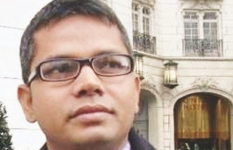 |
|
Photo:Courtesy |
Working as a Lecturer at the Department of Journalism and Media Studies in Jahangirnagar University, Fahad says, “From the womb of Kalikaccha (his village under Sarail Upazila of Brahmanbaria district), to the fine-looking campus of Jahangirnagar University, I have, so far, spent 30 years of my life, the destination of which is still unknown, achievement of which is still, I think, very trifling. Being a young man of 30, I have always asked myself, am I doing the right things? Am I properly utilising my time? What have I done for others?”
Fahad is inspired by his father who was a freedom fighter and a social worker. He stood 18th in his SSC examinations under the Comilla Board in the group of Humanities. After passing his HSC examinations from Dhaka College, he got in to Dhaka University. He followed the suggestion of Dr Arefin Siddique, the Vice-Chancellor of Dhaka University, and joined the Department of Mass Communication and Journalism, which he thinks has been the best decision of his life.
Apart from his studies, he continued with his job as a University reporter of UNB. He passed his Masters Exams acquiring a first class, achieving the 4th position, after which the UNB promoted him to the post of staff correspondent before attaching him to the Prime Minister's Office. He had the opportunity to accompany the Prime Minister during many overseas visits that took him to some 25 countries around the world.
On December 17, 2011, he joined the Department of Journalism and Media Studies of Jahangirnagar University as a Lecturer. He is not only successful for boosting up his career and profession but he is also working for the welfare of the mass people.
“It is obvious that, a person, in the present neo-liberal society, would work for her/ his own success. But I believe success in personal life cannot be the criteria of a real human being. We should dedicate substantial time into people's welfare despite the pressure of a busy life,” says Fahad.
Fahad is involved with a social organisation called “North Sarail Young Graduates Association,” a platform for graduates of his locality. Since 1995, the organisation has been working to spread education in the northern villages of Sarail upazila. Fahad and the members of the organisation are working to keep the socio-political environment of their locality congenial for the students. Every year they arrange general knowledge competition among the students, distribute various types of books among poor students, including other social activities. They have been trying to maintain friendly relations among the local elites and the political leaders by bringing them together in cultural programmes over the years. Besides, the association also operates tree plantation programmes on various occasions in the locality.
Personally, he wishes to take care of the youngsters of his village whose families are not able to bear their educational expenses. He has seen many families in his village who are so poor that they cannot even think about the future of their own children. Fahad plans to help these families by collecting funds from willing institutions and also from his own account.
Fahad envisions a society free from illiteracy. It is worth saying that charity begins at home. That is why he began his mission from his own village. When educated people like Sheikh Adnan Fahad engage themselves in sparking the light of education in every village, then, one day, Bangladesh will truly and inevitably, be enlightened.
By Nusrat Jahan Mou
Shuchi Karim
PhD Candidate for Sexuality and Rights
Currently a PhD Candidate at the International Institute of Social Science (ISS) at The Hague in The Netherlands, the to-be Dr. Shuchi Karim is working on what is possibly the most controversial and tabooed topics not only in Bangladesh but in many conservative nations around the world. Her thesis titled: “Sexualities: Understanding women and sexualities in urban middle class Bangladesh,” covers the discourse on sexuality of both men and women, in same sex relations as well as single women from the urban middle class.
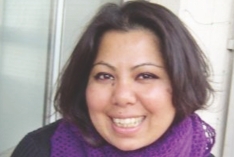 |
|
Photo:Courtesy |
A Language and Literature Graduate from Jawaharlal University with a Masters from the University of Warwick in Gender and International Development, Shuchi Karim has been working on and off with BRAC and its development sector since 1996 and later joined the Department of English and Humanities, BRAC University, as a young lecturer: “I started my career with the BRAC Education programme. I taught in BRAC University from 2003 - 2006 and taught at the Department of Women and Gender Studies, at Dhaka University, as an Assistant Professor from 2006 - 2007.”
Her interest in the field of Gender and Sexuality came with the innate interest in what she defines as the “lived experiences of women/people especially in the marginalised groups.” Being surrounded by a group of friends from the LGBTQ community, her curiosity turned into a search for understanding the “heteronormative structure of our society.” The hunt for such a discourse only resulted in finding blank pages. “In Bangladesh, [we] try to either completely avoid issues of sexuality altogether or carefully tip-toe around it and I wanted to study it from a human and gender perspective,” she says.
Her approach in this dissertation studies life-histories and the “spaces” -- private, public, virtual -- of individuals whose voices are hardly present in any framework of development. She is critically analysing how the power relations, hierarchy and gender is played whenever we address development or address LGBTQ and why a conventional human rights approach may not be feasible here without understanding the social positions occupied by these groups. “Even within sexuality rights initiatives, the voice and presence of women is very faint compared to Gay and Transgender groups. And it is not about only the LGBTQ people who are in concern, the very structure of heteronormativity affects everyone who doesn't fit into it.” With more and more progression and women entering the workforce, causing a shift in the traditional composition in Bangladesh, the challenges to existing norms and traditions will be even stronger, she believes. Under those lights, she believes her thesis is just the beginning of exploring such “shifting times and how it impacts people.”
An active part of DAWN (Development Alternatives with Women for New Era) since 2006, Shuchi plans to get involved with the SRHR initiatives in Bangladesh to help it connect itself across the nation. Not a future planner, but always entering the doors open for her, Shuchi also dreams of starting her own feminist research centre in Bangladesh someday.
By Shayera Moula